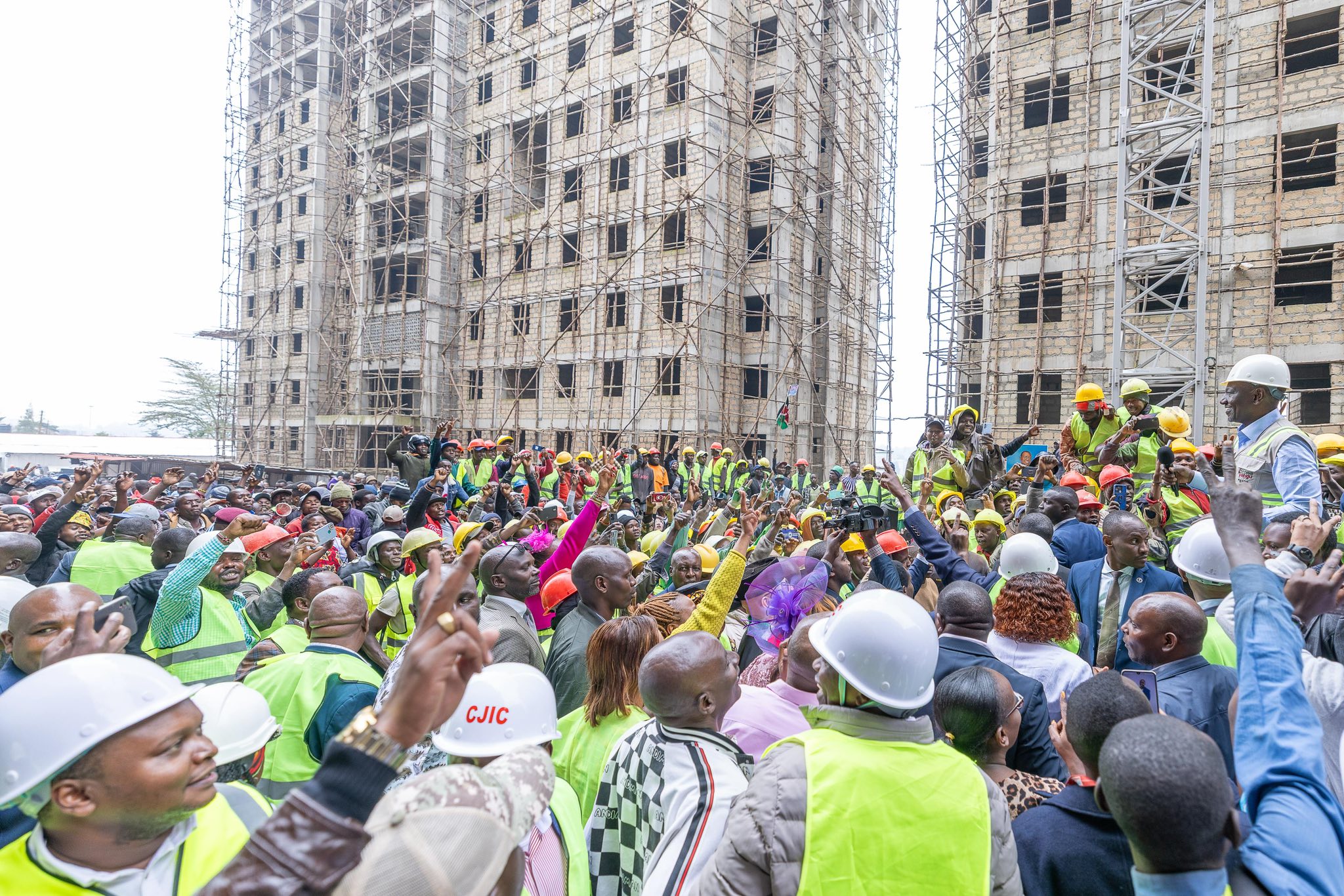
 President William Ruto addresses wananchi after inspecting Limuru affordable housing project in Kiambu county on August 10 /PHOTO /PCS
President William Ruto addresses wananchi after inspecting Limuru affordable housing project in Kiambu county on August 10 /PHOTO /PCS
As we mark three years of President William Ruto’s administration, it is clear that major milestones have been achieved in meeting his election pledges to Kenyans. Central to these achievements is the government’s deliberate focus on job creation, across key sectors: agriculture, education, housing, digital, creative and the Blue Economy.
In agriculture, bold reforms in coffee, tea, sugar and cotton have unlocked new opportunities for farmers and their communities. The revival of six cotton ginneries alone has created 700 jobs in Busia, is set Bungoma, Kitui, Embu and elsewhere. Distribution of 100 high-volume grain dryers to generate more than over 10,000 jobs in cooperatives and small enterprises. Already, cotton farming, ginning and textile activities have supported more than 23,000 rural jobs.
Beyond agriculture, the micro, small, and medium enterprises (MSME) subsector is driving new employment. The refurbishment of 31 County Aggregated Industrial Parks (Caips) is projected to create 9,000 jobs. The Micro and Small Enterprise Authority (MSEA) has directly supported 2,001 youth jobs, while linking enterprises to local and regional markets. These reforms are making it easier for young entrepreneurs to access financing and formalise their businesses. Taken together, the Fifth Administration under President Ruto has so far delivered more than 1.3 million jobs and counting.
On the digital superhighway, information and communication technology and the creative economy, Kenya is rapidly emerging as Africa’s digital hub. Over the years, 50,000 kilometres of fibre optic cable have been laid across the country, connecting schools, villages, and businesses. At Konza Technopolis, innovation is thriving, with more than 16 companies established on-site. We are encouraging many more start-ups and entrepreneurs to open there, where they will find significant opportunities. An investor is also setting up a factory projected to employ more than 10,000 people by early next year.
To expand digital access, 1,500 Wi-Fi hotspots and 404 digital
hubs are now operational, benefiting millions of Kenyans. Nearly 1.9 million
young people have been trained in ICT, coding, cloud computing and AI
technologies, creating almost 300,000 digital jobs in freelancing, e-commerce
and the creative economy. Today, more than 40 million Kenyans transact business
online, while more than 21,500 government services are now available
digitally.
Turning to education and human capital development, the government has employed 76,000 teachers since 2022. In addition, through the Teachers Service Commission, 24,000 new teaching jobs have been advertised this year, creating opportunities for graduates and hope for communities. As promised in our manifesto, we are on track to employ 116,000 teachers by 2027. By January 2026, we will have hired 100,000, with the remaining positions filled before the close of our term.
On Labour Mobility, Kenya has signed six bilateral labour agreements with the United Kingdom, Saudi Arabia, the UAE, Thailand, Germany, and Austria. These agreements have created more than 452,000 jobs abroad, up from only 14,000 in 2022. Employment opportunities now span technical fields, hospitality and healthcare, with 586 nurses already cleared for work overseas.
In the Blue Economy, investments in training and infrastructure are unlocking opportunities for our youth. Already, 875 young Kenyans have been trained in modern fishing methods, giving them safer and more profitable livelihoods. With the sector currently valued at Sh32 billion, its potential exceeds Sh250 billion if fully harnessed. That is why we are building capacity to end decades of exploitation by foreign trawlers, organising fisher folk into cooperatives, and supporting women doing seaweed farming in coastal counties such as Kilifi and Kwale. We are also modernising the industry by working with the Kenya Shipyards Limited to provide affordable, safer boats, moving away from wooden boats that have tragically contributed to the loss of lives.
On Investments and Industry, Export Processing Zones (EPZ’s) have delivered 14,000 new jobs over the past three years, with four new EPZs under construction expected to add 5,000 more. Special economic zones have created an additional 11,000 jobs, supported by partnerships with global investors. For example, at the Naivasha-Mai Mahiu SEZ, Japanese investors are setting up biscuit and milk powder processing plants, alongside an electric car manufacturing facility. Similar developments are underway in other zones, demonstrating Kenya’s growing appeal as a hub for manufacturing and innovation.
At the county level, Aggregation and Industrial Parks are creating jobs by linking farmers directly to processors and markets. Thirteen parks are nearly complete, including the flagship one in Sagana. Our target is to establish all 47 parks nationwide, with a joint investment of Sh500 million each, shared equally between the national and county governments. We commend the counties that have already partnered with us to make this vision a reality.
Meanwhile, tourism continues to be one of Kenya’s strongest job creators. In the past year alone, millions of visitors arrived, while more than five million Kenyans travelled locally. This activity supports 1.6 million jobs, nearly 8 per cent of all employment. The high season this year was especially strong, and the introduction of the Electronic Travel Authorisation (ETA) has been vital in boosting cash inflows from international visitors.
On youth affairs and enterprise development, the creative economy is emerging as a powerful employer. Investments in theatres, musicals and art galleries have generated more than 1,000 jobs, while new initiatives in film, music, and gaming are opening up careers for young people. In addition, more than 32,000 youth have been trained in entrepreneurship and supported with loans exceeding Sh400 million. The government has also launched the NYOTA programme, targeting 100,000 youth for training in entrepreneurship; 70 young people from each of the country’s 1,450 wards are receiving seed capital of Sh50,000 to start businesses.
In health service delivery, Universal Health Coverage (UHC) is being anchored on community health. To date, 18,831 community health promoters (CHPs) have been trained and equipped with kits and smartphones, enabling them to reach households with preventive and promotive services. More than107,000 CHPs are now receiving a government stipend of Sh2,500, ensuring continuity and motivation in their work. These engagements are strengthening prevention, reducing the disease burden, and building a healthier, more productive workforce.
On the Affordable Housing Programme, more than 330,000 jobs have been created across construction, manufacturing, supply chains, professional services, transport, and facility management. Housing projects have also employed and benefited masons, carpenters, plumbers, electricians, architects, surveyors, cement and steel manufacturers, and logistics providers, as well as their families. Beyond direct jobs, housing estates are transforming communities: food vendors, shop owners, boda boda operators, and small suppliers are seeing new opportunities as settlements expand.
The benefits are not only economic but also social. In Nairobi’s Mukuru Estate, a resident, Mr Odhiambo, recently shared how new housing has led to cleaner surroundings, fewer diseases and lower household medical expenses. This demonstrates how affordable housing is not just creating jobs, but also improving the quality of life and giving families more disposable income.
Additionally, in October, the Kenya Defence Forces will recruit General Service Officers, GSO, Cadets, Regulars and Graduates, Specialist Officers, General Duty Recruits, Streets men, Women, and Defence Forces Constables. The National Police Service is recruiting Constables next month.
The government is appealing to all eligible and qualified candidates to visit recruitment centres and even apply online across the country. Engaging in bribery or other corrupt practices to influence recruitment constitutes a criminal offence. As the government has articulated, we remain committed to improving the welfare of all Kenyans without discrimination in adherence to the dictates of our progressive Constitution.
The fulfillment of its promises to the citizenry, under the Beta Plan, are well on course projected to create a better country for us all.



















